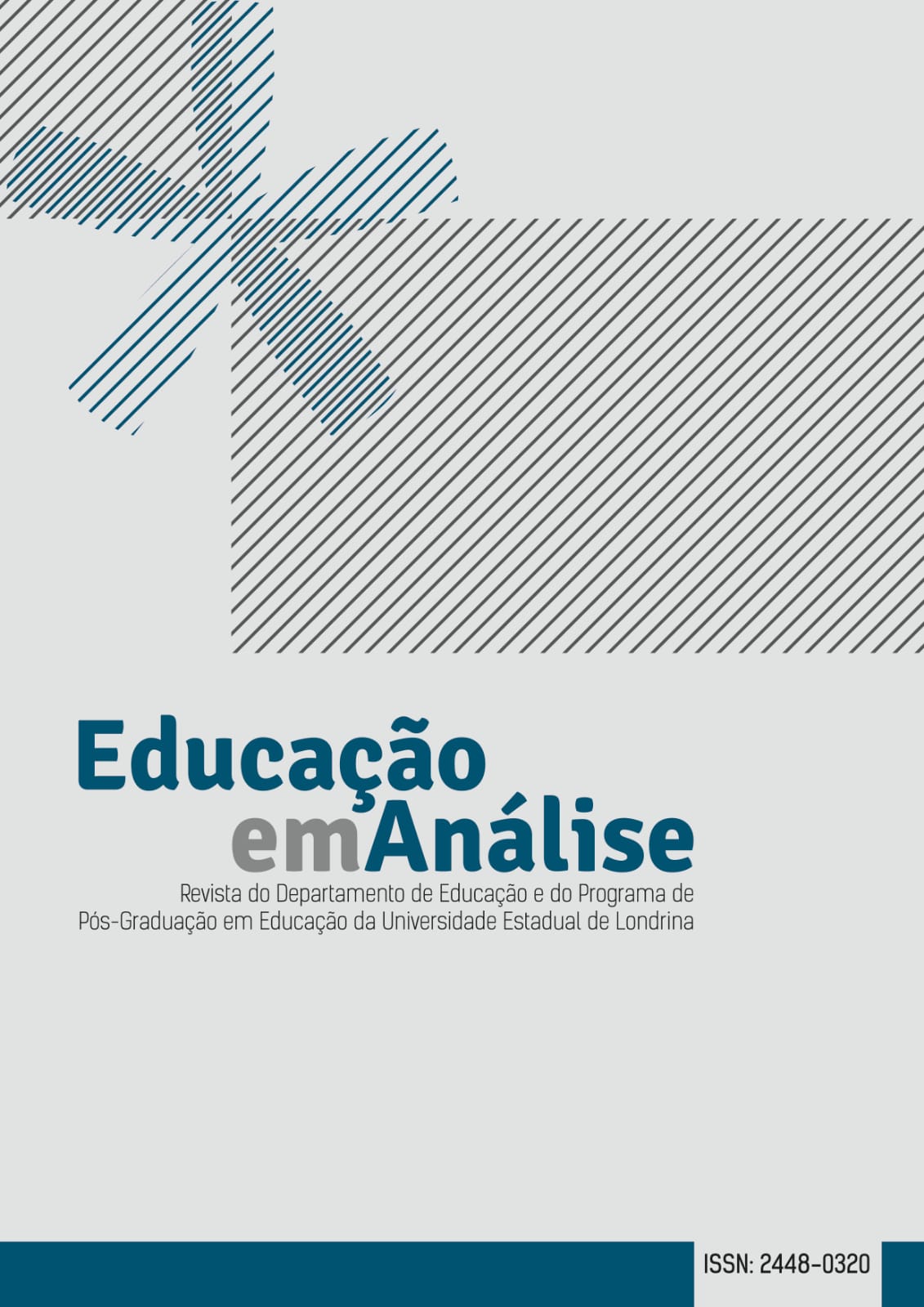Plural babies: A report of a french experience of working with babies
DOI:
https://doi.org/10.5433/1984-7939.2023v8n2p262Keywords:
Babies; caregivers; services; French experience.Abstract
This article aims to report clinical, educational and hospital work with babies: a French experience. In the last decade, we began to have access to a literature about the so-called "competences" of babies, which question the more classic conceptions of a passive baby and "not at all" provocative. These discoveries present a baby that makes us question the different looks around this subject. Who is the baby spoken by scholars? How is this baby thought and spoken of by those who take care of him in the environments: clinical, hospital and educational? Who is this baby that speaks to us? Faced with these questions, we listed the problem-question: What does the baby have to teach us? As a methodology, we used bibliographical research and the report of a French experience of working with babies. Twelve professionals and their teams participated in this experience, each exposing and making considerations about the work developed with babies and their caregivers, and also five care and follow-up institutions and their caregivers. At first, we approach the knowledge about the baby of the 21st century. Below, we bring some clippings elaborated from the dialogues carried out with professionals and researchers who focus on clinical, educational and hospital issues about the baby. Then, we describe the work carried out by these professionals who work with babies.
Downloads
References
BOUKOBZA, C. A relação de uma mãe psicótica com seu filho: acompanhamento de um caso mãe-bebê em um Hospital Dia. In: LAZNIK, M.C.; COHEN, D. (Orgs.). O bebê e seus intérpretes: clínica e pesquisa. São Paulo: Instituto Langage, 2011, p. 15-22.
BUSNEL, M. C. O desenvolvimento da sensorialidade fetal. In: LAZNIK, M.C.; COHEN, D. (Orgs.). O bebê e seus intérpretes: clínica e pesquisa. São Paulo: Instituto Langage, 2011, p. 23-34.
BUSNEL, M. C.; MELGAÇO, R. G. (Orgs.). O bebê e as palavras: uma visão transdisciplinar sobre o bebê. São Paulo: Instituto Langage, 2013.
BUSNEL, M.C. Marie Claire Busnel, uma vida dedicada aos bebês. In: PARLATO-OLIVEIRA, E.; SZEJER, M. (Orgs.). O bebê e os desafios da cultura. São Paulo: Instituto Langage, 2019, p. 13-28.
DOLTO, F. Psicanálise e pediatria. 4. ed. Trad. A. Rio de Janeiro: Guanabara-Koogan, 1988.
DUPOUX, E. Percepção da fala nos bebês. In: LAZNIK, M.C.; COHEN, D. (Org.). O bebê e seus intérpretes: clínica e pesquisa. São Paulo: Instituto Langage, 2011. p. 71-78.
GOLSE, B; AMY, G. Bebês, maestros, uma dança das mãos. São Paulo: Instituto Langage, 2020.
GUELLAI, B. et al. Premises of social cognition: Newborns are sensitive to a direct versus a faraway gaze. Science Reports, v. 10, n. 1, p. 9796, jun. 2020. DOI: https://doi.org/10.1038/s41598-020-66576-8
GRATIER, M. As formas da voz: o estudo da prosódia na comunicação vocal mãe-bebê. In: LAZNIK, M.C.; COHEN, D. (Orgs.). O bebê e seus intérpretes: clínica e pesquisa. São Paulo: Instituto Langage, 2011, p.79-84.
GRATIER, M. Do sentimento de filiação à aprendizagem cultural: intersubjetividade, assinatura e estilos. In: TREVARTHEN, C.; PARLATO-OLIVEIRA, E. (Orgs.). Bebê, corpo e ação. São Paulo: Instituto Langage, 2021, p. 261-272.
HAAG, G. L´expérience sensorielle fondement de l’affect et de la pensée. L’expérience sensoriell de l’enfance. Cahiers du C.O R., n. 1, p. 71-112, 1992.
HAAG, G. Como o espírito vem ao corpo: ensinamentos da observação referentes aos primeiros desenvolvimentos e suas implicações na prevenção. In. HAAG, G. Observação de bebês: os laços de encantamento. Porto Alegre: Artes Médicas, 1997.
LAZNIK, M. C. Linguagem e comunicação do bebê até três meses. In: LAZNIK, M.C.; COHEN, D. (Orgs.). O bebê e seus intérpretes: clínica e pesquisa. São Paulo: Instituto Langage, 2011, p. 79-84.
LAZNIK, M. C. Clínica de Bebês: Litoral entre psicanálise e neurociências. São Paulo: Instituto Langage, 2021.
NAGY, E.; MOLNARB, P. Homo imitations ou homo provocans? Modelo de imprinting a partir de imitação neonatal. In: BUSNEL, M. C.; MELGAÇO, R. G. (Orgs.). O bebê e as palavras: uma visão transdisciplinar sobre o bebê. São Paulo: Instituto Langage, 2013, p. 53-74.
PARLATO-OLIVEIRA, E. Como falam os bebês? Explorações sobre a fala e o campo da linguagem na clínica com bebês. In: BARBOSA, D. C.; PARLATO-OLIVEIRA, E. (Orgs.). Psicanálise e Clínica com Bebês: Sintoma, Tratamento, Interdisciplina na Primeira Infância. São Paulo: Instituto Langage, 2010. p. 125-138.
PARLATO-OLIVEIRA, E. Saberes do bebê. São Paulo: Instituto Langage, 2019.
PARLATO-OLIVEIRA, E. O bebê e as tramas da linguagem. São Paulo: Instituto Langage, 2020.
PARLATO-OLIVEIRA, E. Psicanálise e Autismo: o que nos fala este sujeito? In: OLIVEIRA, G. C. et al. (Orgs.). Música e Autismo: ideias em contraponto. Minas Gerais: Editora UFMG, 2022, p. 57-78. DOI: https://doi.org/10.7476/9786558581116.0004
PARLATO-OLIVEIRA, E.; SZEJER, M. (Orgs.). O bebê e os desafios da cultura. São Paulo: Instituto Langage, 2019.
SZEJER, M. O bebê excluído da fala. In: BUSNEL, M. C.; MELGAÇO, R. G. (Orgs.). O bebê e as palavras: uma visão transdisciplinar sobre o bebê. São Paulo: Instituto Langage, 2013. p. 108-134.
TREVARTHEN, C. Desenvolvimento da intersubjetividade no primeiro ano de vida. In: LAZNIK, M.C.; COHEN, D. (Orgs.). O bebê e seus intérpretes: clínica e pesquisa. São Paulo: Instituto Langage, 2011. p. 117-126.
TREVARTHEN, C.; AITKEN, K. J.; GRATIER, M. O bebê nosso professor. São Paulo: Instituto Langage, 2019.
TREVARTHEN, C.; PARLATO-OLIVEIRA, E. (Orgs.). Bebê, corpo e ação. São Paulo: Instituto Langage, 2021.
VANIER, C. Os mecanismos operantes no desenvolvimento psíquico do bebê prematuro e os riscos eventuais de patologia. In: BUSNEL, M. C.; MELGAÇO, R. G. (Orgs.). O bebê e as palavras: uma visão transdisciplinar sobre o bebê. São Paulo: Instituto Langage, 2013. p. 59-74.
Downloads
Published
How to Cite
Issue
Section
License
Copyright (c) 2023 Cleide Vitor Mussini Batista, Erika Parlato-Oliveira

This work is licensed under a Creative Commons Attribution-NonCommercial 4.0 International License.
The journal reserves the right to make normative, orthographic and grammatical changes in the originals, with the aim of maintaining the cultured standard of the language and the credibility of the vehicle. It will, however, respect the authors' writing style. Alterations, corrections, or suggestions of a conceptual nature will be sent to the authors when necessary. In these cases, the articles, after being adequate, should be submitted to a new appreciation.









